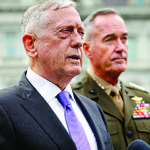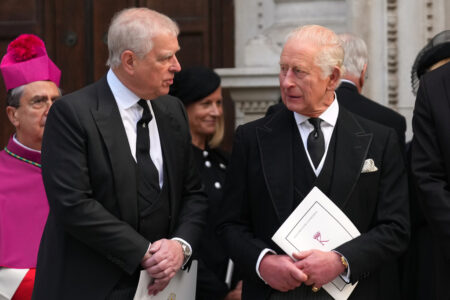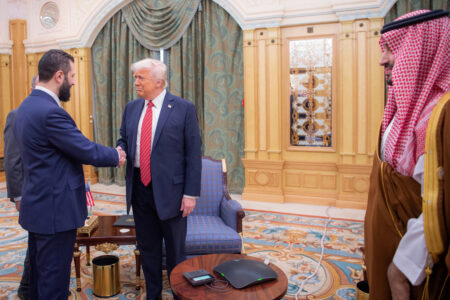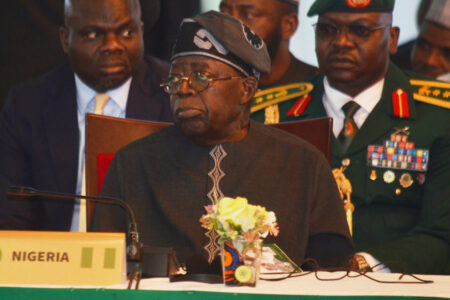Mattis: North Korea Threat Could Lead to Massive US Response

Defense Secretary Jim Mattis, left, accompanied by Joint Chiefs Chairman Gen. Joseph Dunford, right, speaks to members of the media outside the West Wing of the White House in Washington, Sunday, Sept. 3, 2017, regarding the escalating crisis in North Korea's nuclear threats. (AP Photo/Pablo Martinez Monsivais)
WASHINGTON (AP) — Defense Secretary Jim Mattis on Sunday shot back at North Korea’s claimed test of a hydrogen bomb with a blunt threat, saying the U.S. will answer any threat from the North with a “massive military response — a response both effective and overwhelming.” President Donald Trump threatened to halt all trade with countries doing business with the North, and faulted South Korea for its “talk of appeasement.”
The tough talk from America’s commander in chief and the retired Marine general he picked to oversee the Pentagon came as the Trump administration searched for a response to the escalating crisis. Kim Jong Un’s regime on Sunday claimed “perfect success” in an underground test of what it called a hydrogen bomb. It was the North’s sixth nuclear test since 2006 — the first since Trump took office in January — and involved a device potentially vastly more powerful than a nuclear bomb.
Trump, asked during a trip to church if he would attack the North, said: “We’ll see.”
Tthe immediate focus appeared to be on ratcheting up economic penalties, which have had little effect thus far.
In South Korea, the nation’s military said it conducted a live-fire exercise simulating an attack on North Korea’s nuclear test site to “strongly warn” Pyongyang over the latest nuclear test. Seoul’s Joint Chiefs of Staff said the drill involved F-15 fighter jets and the country’s land-based “Hyunmoo” ballistic missiles. The released live weapons “accurately struck” a target in the sea off the country’s eastern coast, the JCS said.
The U.N. Security Council scheduled an emergency meeting at the request of the U.S., Japan, France, Britain and South Korea. It would be the Security Council’s second urgent session in under a week on the North’s weapons tests, which have continued in the face of a series of sanctions.
Members of Congress expressed alarm at the North’s test and emphasized strengthening U.S. missile defenses. Leaders in Russia, China and Europe issued condemnations.
Mattis told reporters that America does not seek the “total annihilation” of the North, but then added somberly, “We have many options to do so.” Mattis also said the international community is unified in demanding the denuclearization of the Korean peninsula.
The precise strength of the underground nuclear explosion had yet to be determined. South Korea’s weather agency said the artificial earthquake caused by the explosion was five times to six times stronger than tremors generated by the previous five tests.
Sunday’s detonation builds on recent North Korean advances that include test launches in July of two ICBMs that are believed to be capable of reaching the mainland U.S. The North says its missile development is part of a defensive effort to build a nuclear deterrent that can target U.S. cities.
The Arms Control Association said the explosion appeared to produce a yield in excess of 100 kilotons of TNT equivalent.
Hans Kristensen, a nuclear weapons expert at the Federation of American Scientists, said the North probably will need to do more tests before achieving a functioning hydrogen bomb design.
Beyond the science of the blast, North Korea’s accelerating push to field a nuclear weapon that can target all of the United States is creating political complications for the U.S. as it seeks to balance resolve with reassurance to allies that Washington will uphold its decadeslong commitment to deter nuclear attack on South Korea and Japan.
Trump also suggested putting more pressure on China in hopes of persuading Beijing to exert more effective leverage on its neighbor. Trump tweeted that the U.S. is considering “stopping all trade with any country doing business with North Korea.”
It’s unclear what kind of sanctions might make a difference. Lassina Zerbo, head of the U.N. test ban treaty organization, said sanctions already imposed against North Korea aren’t working.
China’s official Xinhua News Agency said President Xi Jinping and Russian leader Vladimir Putin agreed “to adhere to the goal of the denuclearization of the Korean Peninsula, have close communication and coordination and properly respond” to the test.
Experts have questioned whether the North has gone too far down the nuclear road to continue pushing for a denuclearization of the Korean Peninsula, an Obama administration policy goal still embraced by Trump’s White House.
“Denuclearization is not a viable U.S. policy goal,” said Richard Fontaine, president of the Center for a New American Security, but neither should the U.S. accept North Korea as a nuclear power.





